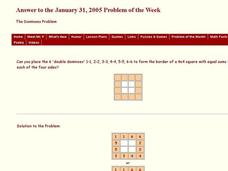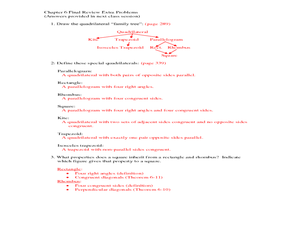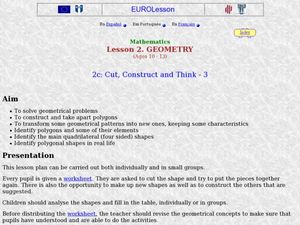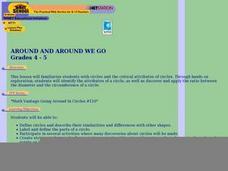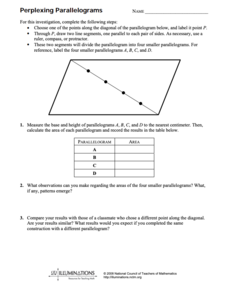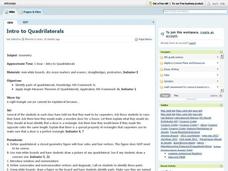Curated OER
Tessellation Trial and Error
In this interactive lesson, students review attributes of equilateral polygons. They are introduced to the concept of a tessellation. Using protractors and pre-cut shapes, students arrange a variety of tiles to create tessellations. They...
Curated OER
The Dominoes Problem
In this dominoes puzzle, students, using dominoes, create a 4 x 4 square which has equal sums for each of the four sides. This one-page problem contains 1 problem.
Curated OER
Geometric Figure Quiz
In this geometric figure worksheet, students answer 10 multiple choice questions about geometric figures. Students find missing angles, interior angles, properties of polygons, etc.
Curated OER
Learning by Logic - Total Surface Area
Geometers calculate the area of plane surfaces using the formulas for the area of a square, rectangle, and triangle. They develop the formula for calculating the total surface area of two geometric solids: the cube and rectangular prism.
Centre for Innovation in Mamatics Teaching
Area, Perimeter and Volume
Develop young mathematicians' knowledge of two- and three-dimensional shapes with this geometry workbook. From learning about the classifications of different shapes and figures to calculating their area, perimeter, and volume, this...
Balanced Assessment
Square and Circle
To determine the dimensional change to quadruple the area, class members determine how to increase the dimensions of a square and a circle to increase the perimeter by a given factor. they then calculate the necessary factor to...
Curated OER
Tessellations
Students identify and construct figures that tessellate. They investigate which regular polygons tessellate and how to modify them to make other tessellating figures. Students explore how naturally occurring tessellations have been...
Curated OER
Polygons and Sketching
In this geometry worksheet, students define and draw quadrilaterals. They differentiate between the different shapes. There are 3 questions with an answer key.
Math eBook
Perimeter Worksheet
In this perimeter instructional activity, learners find the perimeter of given regular and irregular polygons. This four-page instructional activity contains 20 problems. This interactive instructional activity may be completed online or...
Curated OER
Geoboard Squares
Students create squares of different sizes on a geoboard. They find and describe a pattern. Students use the pattern to determine the number of squares possible on a 10-by-10 geoboard. They create squares with a horizontal base (and...
Curated OER
Area: Algebra/Geometry Institute Summer 2009
Students compute the area of a rectangle. In this area lesson, students measure the sides of rectangles and squares. They cut figures, measure them, and determine the area of each given figure. Students justify their...
Curated OER
The Corners of a Square
In this geometry worksheet, 10th graders cut the corners off of a square so that a regular octagon remains. Students determine the length of each side of the octagon. The one page worksheet contains one problem with the...
Curated OER
Recognize and Draw Shapes Word Problems
It's time for a geometry warm up! Geometry scholars examine a figure to determine its name from a list of four choices. The figure, a trapezoid, is large enough for the whole class to see if you were to project this. An explanation at...
California Education Partners
Fun on the Farm
Let imaginations run wild as participants design animal pens. A performance task challenges young mathematicians to determine the perimeter or a missing side length of different animal pens. They then design pens that meet given...
Exploratorium
Rotating String Shapes
Here is a very interesting way of studying triangles and polygons. Pupils work together and use pieces of string to create a variety of shapes. Depending on how many kids are manipulating the string at any one time, the number of...
Curated OER
Crossword: Geometric Shapes
Using a word bank, mathematicians fill out a crossword puzzle using 9 clues. Each clue describes a shape, using details such as the number of sides, angle degrees, and the shape category. For example: "A quadrilateral with four equal...
Curated OER
Cut, Construct and Think 3
Students identify and create shapes. In this geometric shapes lesson, students identify various polygons and try to create new shapes using existing polygons.
Houghton Mifflin Harcourt
Angle Pairs - Reteach 14.2
Practice recognizing types of additive angles with a worksheet in which pupils review adjacent, interior and exterior, complementary, and supplementary angles and use a diagram to give examples of them. Be aware that the diagram involves...
Curated OER
Around and Around We Go
Fourth graders discover that a polygon is a closed figure formed by line segments, and that the perimeter of a polygon is the sum of the lengths of its sides. They utilize a worksheet imbedded in this plan to gain lots of practice with...
Curated OER
Cube Count
In this cube counting worksheet, students solve 5 word problems that refer to the illustration of a stack of cubes. First, they determine how many cubes would be needed to make four steps, then seven and eight steps. Students also...
Curated OER
Parallelograms
In this parallelograms activity, 10th graders identify and describe a quadrilateral, a diagonal, and a parallelogram in 7 different problems. First, they find the values of x, y, and z in each quadrilateral to prove that it is a...
Curated OER
Analyzing Body Angles
Students investigate angles of polygons. In this geometry lesson, students identify the relationship between angles and the number of sides in a polygon. They differentiate between sumilarity anf congruence in angles and sides.
National Council of Teachers of Mathematics
Perplexing Parallelograms
In this geometry worksheet, young mathematicians divide a parallelogram into four, by choosing points along a diagonal. Students calculate the area of each parallelogram and look for any patterns that may emerge. The one-page...
Curated OER
Intro To Quadrilaterals
Students engage in a lesson that is concerned with the concept of quadrilaterals and how they are used to create a rectangle for a door. They create a drawing of a quadrilateral while finding the sum of the angles. They practice problems...



